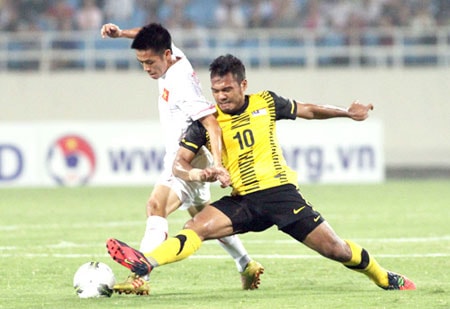Identify your competitors
(Baonghean) - To avoid the risk of facing Thailand - the team considered the strongest in the AFF Cup 2014, the Vietnamese team had a very good match against the Philippines and won the top spot in the group. However, with Malaysia as the opponent, the upcoming two semi-final matches will not be easy for Coach Miura's students.
(Baonghean) - To avoid the risk of facing Thailand - the team considered the strongest in the AFF Cup 2014, the Vietnamese team had a very good match against the Philippines and won the top spot in the group. However, with Malaysia as the opponent, the upcoming two semi-final matches will not be easy for Coach Miura's students.
After losing the championship to Singapore in 2012, the Football Association of Malaysia (FAM) set very high targets for the national team at the AFF Cup 2014. Compared to 2 years ago, the most obvious change of the Malaysian national team is in the coaching bench, when coach Rajagobal - who led the Malaysian teams to win the SEA Games 2009, 2011 and AFF Cup 2010, gave way to another domestic coach, Mr. Dollah Salleh. However, the Malaysian squad has not changed much. It is still the familiar names that made 3 championships, such as: Indra, Sali, Talaha, Safiq, Kunalan, Badroll Bakhtiar... However, it seems that age as well as lack of motivation after being "full" of titles has made the players heavy and lacking resilience. Therefore, compared to the time of winning the SEA Games 2009, 2011 and AFF Cup 2010, Malaysian football is showing signs of slowing down. This is clearly shown by the fact that among the candidates for the AFF Cup 2014 championship, Malaysia is the team with the worst preparation for this tournament when losing 4 out of 5 friendly matches before the tournament. This team lost 1-4 to Tajikistan, 0-2 to Indonesia, 0-3 to Syria, 1-3 to the Vietnamese team and only won against the weak opponent Cambodia 4-1.
 |
| Van Quyet (Vietnam) and Safee Sali (Malaysia) in a friendly match before the tournament. Photo: Internet |
However, we should not look at Malaysia's friendly match record to underestimate this opponent. And this assessment is further reinforced when entering the tournament, the Malaysian players played much better. In the first match of the group stage, Malaysia drew with Myanmar when they were short more than half the match. In the second match, although they were defeated by Thailand with a score of 3-2, the Malaysian players also played quite well and took the lead twice. In the final match, in a must-win situation to enter the semi-finals, Coach Dollah's students came from behind to win spectacularly 3-1 against host Singapore. Watching Malaysia's matches, it is easy to see that Malaysia's playing style is basically based on the physical strength and speed of the players. Like his predecessor Rajagobal, Coach Dollah also instructed his students to play solidly in defense and take advantage of quick counterattacks with long, high passes to take advantage of the above two advantages. This style of play is actually not complicated and not too difficult to grasp, but finding an effective solution to neutralize it is not a simple matter. In the past, in the final of the 25th SEA Games (2009) and the semi-finals of the AFF Cup 2010, despite being rated much higher before the match, the Vietnamese teams all lost to the Malaysians because they could not neutralize this style of play.
But also considering the historical factor, Vietnamese fans have every reason to believe that the Vietnamese team can completely defeat Malaysia. Since 2010, the Vietnamese team has not faced Malaysia in any official tournaments, but in friendly matches, our players have always defeated this team. In 2012, in a friendly match before the AFF Cup 2012, Coach Phan Thanh Hung's students defeated the students of "godfather" Rajagobal with a score of 2-1. And in mid-November, Coach Miura's students also defeated Malaysia with a score of 3-1. The common point in both matches is that the Vietnamese players increased ball control in the middle of the field, limited high balls and increased attacks in the middle with short balls.
According to experts, Coach Miura will not choose a physical style of play with Malaysian players. In the group stage, against physically strong teams such as Indonesia and the Philippines, the Vietnamese team, although playing fiercely, still mainly relied on their technical ball control ability. In addition, Coach Miura's personnel and tactics arrangement made our team the most difficult team to predict in this tournament. Therefore, although we no longer have home field advantage (the semi-finals are played in a home and away format), with those strengths, if there is more innovation and creativity from the players, overcoming this opponent to win the right to enter the final is completely within reach.
Mai Anh






